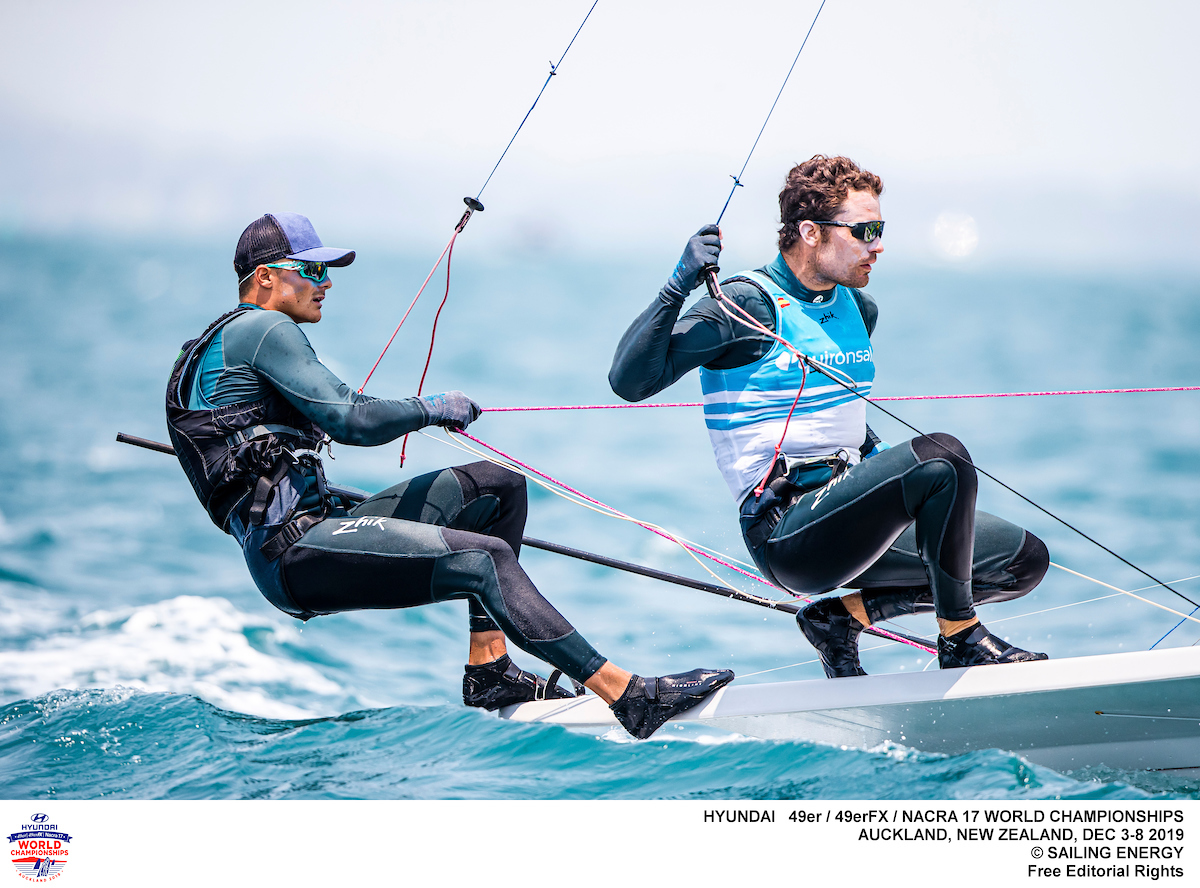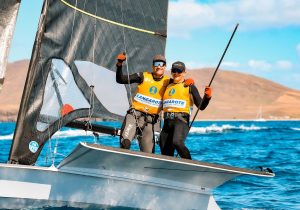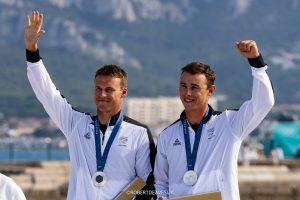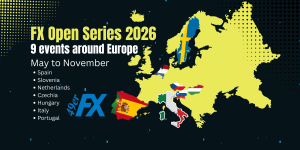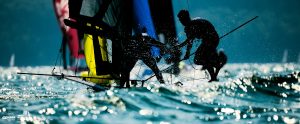After the 2019 49er, 49erFX and Nacra 17 World Championships wrapped up with some amazing medal races and the dust settled in Auckland, the Tokyo 2020 Olympics picture began to reveal itself. With under 200 days until the Games commence in July there are only a handful of qualification spots remaining in the three classes.
Who had already qualified prior to Auckland?
The first Olympic qualification event was the Aarhus 2018 World Sailing Championships, offering 40% of the Olympic spots. Alongside the automatically qualified host nation of Japan we saw many of the higher ranking teams book their spots to the Olympics.
The next opportunity (in hierarchical qualifying order) to qualify for Tokyo 2020 was at the 2019 World Championships held in Auckland, with four spots available in the 49er, five in the Nacra 17 and six in the 49erFX.
Who qualified in Auckland?
In the 49er class, three of the expected teams found their form to book a ticket to Japan, including Spain, Austria and Poland. The surprise nation to secure their spot was the Netherlands. Bart Lambriex and Pim van Vugt were on the Dutch 2024 development program earlier in 2019. In a strategic shift by the TeamNL, which sees the Dutch apply more focus to the high-performance Olympic classes, strong sailing from this pair saw them receive full support from their nation and turn that into an Olympic qualifying performance in Auckland.
In the 49erFX, we saw Germany, Argentina, U.S.A., Poland, Spain and Singapore lock in their spots for Tokyo. None of these qualifying teams came as a particular surprise as each have sailed well over the past 18 months, however the highly competitive 49erFX fleet didn’t allow any team to have an easy road to qualification.
In the Nacra 17 the qualifying spots went to Spain, France, Germany, U.S.A. and Norway. One take away from the countries to qualify in Auckland was that the teams were mostly not those which had represented their countries in Rio 2016. Tara Pacheco and Florian Trittel (ESP), Riley Gibbs and Anna Weis (USA), and Quentin Delapiere with Manon Audinet (FRA) beat out their fellow countrymen and Olympians in an apparent changing of the guard in these Nacra 17 nations.
Continental Qualifiers
The remaining qualification process will see one spot allocated from each of the continental qualifying events in 2020. The exceptions are North and South America which held their continental qualifiers at the 2019 Pan American Games.
Keen followers will notice that Argentina and the U.S.A. are countries which qualified at both the 2019 Auckland World Championships and the 2019 Pan American Games in the 49erFX and Nacra 17 classes. However the qualification process selects from the 2019 World Championship results before the 2019 Pan American Games results.
This means that from an Olympic qualification point of view, the highest placed non-qualified teams from the 2019 Pan American Games are Brazil and Canada in the 49er, Canada and Peru in the 49erFX and Puerto Rico and Uruguay in the Nacra 17
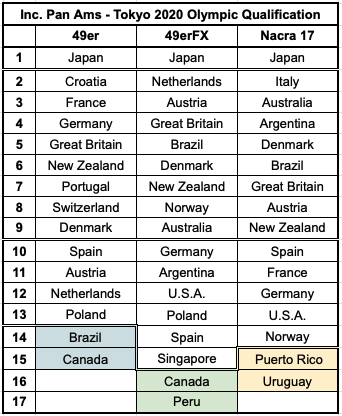
As we head into 2020, one spot in each class will be available to nations from Oceania, Asia, Europe and Africa. These Olympic births will be decided at the respective 2020 Continental Championships, with the exception of Oceania, who are using the 2020 World Championships as their continental qualifier.
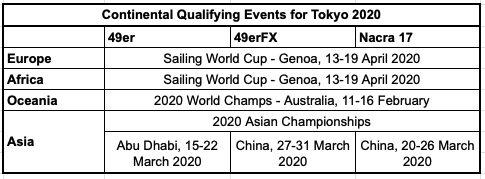
Who is yet to qualify & what will 2020 bring?
In 2020, our first qualifier is the Oceania continental slot to be taken from the 2020 World Championship results. The only country expected to compete which has not yet qualified is the Australian 49er team so we can safely assume they will gain this berth. Despite a long history of success in the class, the Australians have failed to deliver when it matters and bring in to question if an Australian 49er team will be sent to Tokyo.
The Swedish 49erFX squad must be bitterly disappointed yet to qualify for Tokyo 2020 after having three teams regularly place in the top 15 throughout 2018 and 2019. The highest place team was Gross and Klinga who finished in 17th, with Gross recovering from an ankle injury that held back their pre-regatta preparation. Their teammates Wester and Nester were top ten at every regatta this season but could only manage to finish 23rd, while the younger pairing of Bobeck and Tengstrom, who claimed bronze at the 2019 Volvo Europeans, floundered in 47th.
Arguably the biggest surprise result from Auckland was the inability of Yago and Klaus Lange (ARG) to qualify in the 49er. Regularly in the top 10, the Argentinian brothers represented their country at Rio 2016 and were expected to qualify without issues. At the prize ceremony in Auckland, a visibly distraught Yago Lange questioned what he would do after not qualifying. In accepting the first annual Environmental Stewardship award for the fleets, Yago hit a realisation during his speech that despite great success in the last three years it had not accumulated in an Olympic berth. No doubt he will continue in his #sailors4thesea environmental movement against plastic pollution.
The Worst Kind of Last Chance
If any qualified nation opts not to send a team to the Tokyo 2020 Games, or if there are no unqualified nations from a continent trying to qualify at their continental championship, then the highest placed unqualified nation from the 2019 Auckland Worlds will acquire that Olympic berth.
Here is the four highest ranked unqualified countries in each class from the 2019 Auckland Worlds:
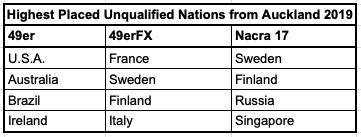
The Olympic Qualification Process – A Summary
In its basic form the Olympic sailing qualification system provides one spot in each event for the host nation of Japan, followed by 40% of the spots allocated based on results from the 2018 Aarhus World Championships. The next group of nations qualify at the 2019 Auckland World Championships with the final opportunity being the 2019/2020 continental qualifiers. The continental qualifiers give six spots, one from each continent; Africa, Asia, Europe, North America, Oceania and South America.
For a more indepth look at the Olympic Qualification Process, read our previous article here.

